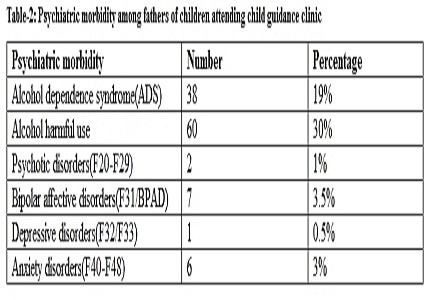Psychiatric morbidity in parents of children with behavioral problems attending child guidance clinic
Abstract
Introduction: Psychiatric morbidity in parents can influence behavioral problems in children and behavioral problems in child can cause heightened family distress. Our objectives were to evaluate the frequency and nature of psychiatric morbidities in parents of children with psychiatric illness and to study their association.
Methodology: The study sample included parents of children with behavioral problems attending the child guidance clinic, Government Medical College, Kottayam, Kerala. Children were initially screened using Childhood Psychopathology Measurement Schedule and in those screened positive the diagnosis was confirmed using the DCR criteria for ICD -10. The parents of those children were screened using the General Health Questionnaire-12 and those who scored above cut off were evaluated for psychiatric disorders by taking history doing detailed physical examination and mental status examination. Statistical analysis was done to find the frequency and nature of illnesses and the association between parental and child diagnoses.
Results: 61% of the fathers and 25% of the mothers had psychiatric morbidity. Significant associations were found between 1) conduct disorders in children with fathers’ alcohol dependence and bipolar affective disorder and mothers’ depressive disorder 2) ADHD (F90.0) in children with fathers’ alcohol harmful use 3) Hyperkinetic conduct disorder(ADHD+CD) in children with fathers’ alcohol dependence and bipolar affective disorder and mothers’ depression 4) Pervasive developmental disorder in children with fathers’ alcohol dependence 5) Mental retardation in children with fathers’ alcohol dependence.
Conclusion: Parents of children with behavioural problems have higher rate of psychiatric morbidity and there are significant associations between many conditions in parents and their children.
Downloads
References
2. Creswell, C., & Brereton, J. (2000). Community mental health services and the children of service users.Clinical Psychology Forum, 144, 4-6.
3. Oyserman D., Mowbray, C. T., Meares, P. A., & Firminger, K. B. Parenting among mothers with a serious mental illness. American Journal of Orthopsychiatry, 2000 July;70(3), 296-315. PMID:10953777. [PubMed]
4. Weissman, Myrna M, Offspring of depressed parents: 10 years later. Archives of General Psychiatry, October 1997;54(10), 932. [PubMed]
5. WHO ,ICD 10- International Classification of Diseases ,Diagnostic Criteria for Research, Geneva, World health Organisation, 2003.
6. Savita Malhotra ,V K Varma et al. Childhood psychopathology measurement schedule: development and standardization, Indian J Psychiatry. 1988 Oct-Dec; 30(4): 325–331.
7. D. P. Goldberg, R. Gater et al. The Validity Of Two Versions Of The GHQ In The Who Study Of Mental Illness In General Health Care. Psychological Medicine, January 1997, 27(1), 191- 197. 10.1017/S0033291796004242.
7. Christian P Jacob, Jasmin Romanos Co-morbidity of adult attention-deficit/hyperactivity disorder with focus on personality traits and related disorders in a tertiary referral centerEuropean Archives of Psychiatry and Clinical Neurosciences September 2007 ;257(6):309–317 DOI 10.1007/s00406-007-0722-6.
8. T S Satyanarayana Rao, M S Darsan et al , Suttur study: An epidemiological study of psychiatric disorders in south Indian rural population, Indian Journal of Psychiatry, Jul‑Sep 2014,56(3) 238-245 doi: 10.4103/0019-5545.140618.
9. Chronis AM,LaheyBB,PelhamWE,KippHL,BaumannBL,Lee SS(2003):Psychopathology & substance abuse in parents of young children with attention deficit/hyperactivity disorder:J.Am.Acad.Child Adolesc.Pychiatry,December 2003 ,42(12):1424-1432. DOI:10.1097/00004583-200312000-00009.
10. Hemant Chandorkar& Brig. P.K. Chakraborty,Psychological Morbidity Of Parents Of Mentally Retarded Children, Indian Journal of Psychiatry, July to September 2000, 42 (3), 271-274 PMCID: PMC2958351.

Copyright (c) 2017 Author (s). Published by Siddharth Health Research and Social Welfare Society

This work is licensed under a Creative Commons Attribution 4.0 International License.


 OAI - Open Archives Initiative
OAI - Open Archives Initiative


